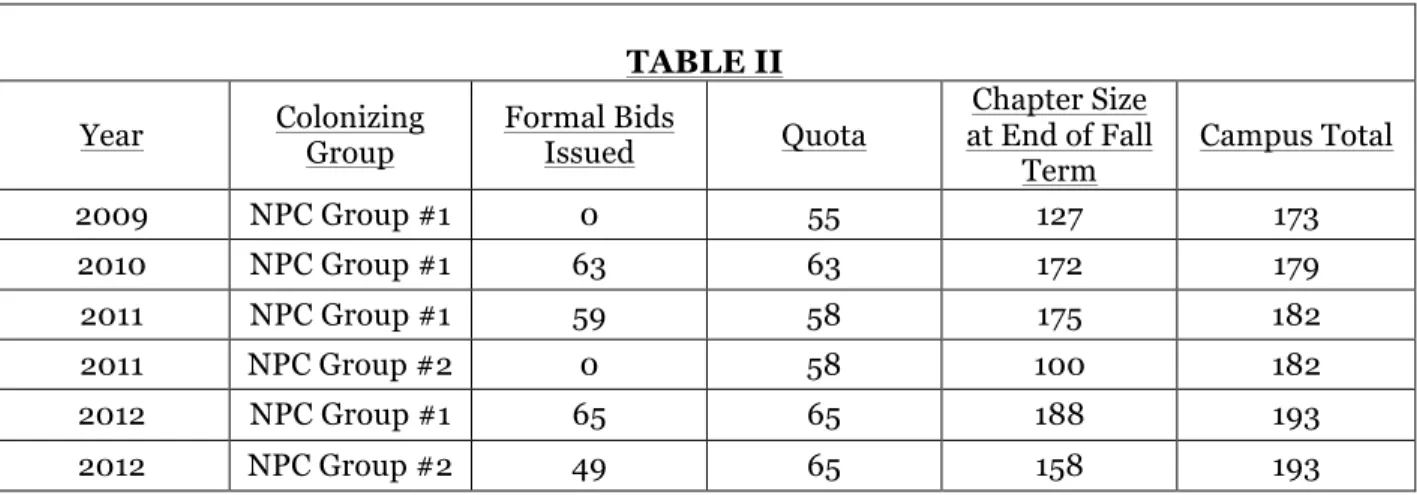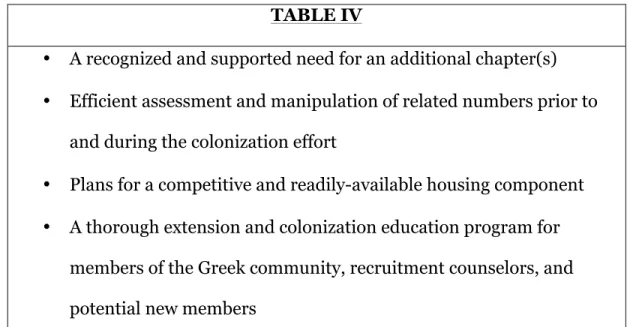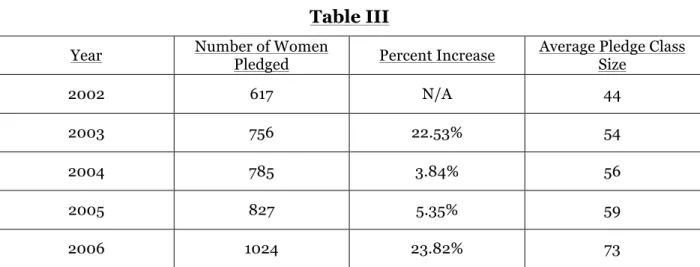The outline of the Panhellenic Conference's formal expansion process helped structure this growth, allowing the process to meet the needs of growing collegiate Panhellenic communities and allowing NPC member clubs to further expand the scope of their sisterhood to expand. In addition, scholarly works on Greek life, student newspaper publications, extension papers of the National Panhellenic Conference and its student societies were examined. Although the expansion process has been streamlined and standardized thanks to the efforts of the NPC, the setting in which the effort takes place has a major impact on the additional efforts that must be made to ensure success.
HISTORY OF SORORITIES
The late twentieth century saw a rapid increase in the establishment of new societies in institutions of various types (Wells & Worley, 2011). The establishment of groups such as NPC serves as a legacy of the era's new and progressive emphasis on democratic student government (Wells & Thelin, 2002). It is now one of the largest women's organizations in the world and formulates policy on issues of interest and concern to it.
ROLE OF THE RESEARCHER
As a student pursuing a degree in business administration, the researcher was able to consider these challenges and the expansion process not only from the point of view of the association community, but also from a corporate point of view. By combining these perspectives and experiences, the researcher found that the expansion process is essentially a business plan consisting of variables that should add value through each stage of the expansion process, culminating in the final product of a strong colony. The researcher considered these variables in the context of a "recipe for success" and questioned whether such a thing could exist for an expansion effort.
It was the researcher's desire that her findings be used by the Panhellenic community at the University of Mississippi in their upcoming colonization efforts and any future expansion. The researcher is aware that the SEC campuses and NPC member groups can be identified through the secondary sources used for research. In addition, the researcher interpreted the decision of the NPC member student groups not to comment on their expansion efforts and strategies to protect what they see as a competitive advantage.
Throughout the research process, the researcher was able to compare her findings to her personal experience as a member of an SEC Panhellenic community. In addition, the researcher saw the difficulty that some new members find in transitioning. In the end, the researcher's work was fueled by a desire for the final body of work to result not only in a deeper personal knowledge and understanding of the extension process, but a final product that would help the University of Mississippi in its upcoming colonization efforts in fall 2013 and fall 2015.
It is the earnest hope of the researcher that these findings prove beneficial to the University of Mississippi's Office of Greek Life and Panhellenic community, and that.
THE EXTENSION PROCESS
According to the NPC Extension Process timeline, the extension process should be expected to take nearly a year and the Panhellenic Research Committee should be formed in early fall. Each Panhellenic delegate represents his respective chapter in the extension vote (Panhellenic College Steps of the NPC Extension Process 1-4, n.d.). After the official vote and the announcement of its result, the minutes of the meeting of the extension vote must be sent to the chairman of the KKP Extension Committee and a Panhellenic Extension Committee must be formed in case the vote is in favor of the extension.
Next month, the campus is expected to announce its extension opportunity in the NPC Extension Bulletin, which is distributed to all twenty-six NPCs. The NPC Extension Process Model suggests setting a February deadline for interested groups of NPC members to submit these materials. The NPC suggests that the Panhellenic leaders keep letters of intent from all such NPC member groups on file for future extension efforts (NPC Extension Process Exhibit A Timeline, n.d.).
The NPC Extension Committee advises that packets sent to selected societies include a schedule for the day of their presentation, information on accommodation options, transportation and maps, information. Groups that have made formal presentations but have not been selected must also be notified (NPC Extension Process Exhibit A, n.d.). NPC does not recommend that collection be more than four years out (NPC Extension Process Best Practices at NPC Extension, n.d.).
The NPC Expansion Process: Supporting Efforts for Colonies specifies that the NPC requests that the College Panhellenic and college/university continue to provide assistance to the colonizing group until the new group has reached a healthy.
SOUTHEASTERN CONFERENCE COLLEGE #1….…
In 2010, the quota for NPC chapters on campus reached 131, the highest quota recorded by the Panhellenic community in the country that year. Greek Life officials felt that it would be critical to add chapters to the Panhellenic community as interest in Greek Life was already strong and expected to continue to grow (personal communication, April 4, 2013). The campus was opened for expansion in 2010 and approximately five groups have completed research visits to the campus, while many additional NPC groups have contacted the Office of Greek Life to express interest in the possibility of expansion.
During the 2011 formal Panhellenic recruitment, the quota increased to 151, again the highest quota in the country for a Panhellenic community. This time, Greek Life officials were prepared for the challenge of securing housing plans for future cohorts. During the year between the expansion efforts, Greek life leaders were able to make arrangements for short-term facilities to accommodate the new chapters and begin researching the availability of land on which.
Historically, no group within the Panhellenic community has struggled to meet a quota during recruitment in the past two to three years. With all groups successfully meeting or exceeding their quota in recent years and supporting expansion efforts, the Panhellenic community and Greek Life leaders have been able to focus solely on ensuring the success of new chapters without the added concern of bringing a historically weak chapter to bear (personal communication, 4 April 2013). Greek Life leaders placed great importance on thoroughly educating the Panhellenic community on what the expansion and colonization processes would involve and familiarizing them with the colonization groups.
After reflecting on the extension effort, a Greek Life administrator felt the one area that could have been improved was the communication and education aspect of preparing the Greek community for the extension process and colonization (personal communication, April 4, 2013).
SOUTHEASTERN CONFERENCE COLLEGE #2…
When determining the order in which the groups would colonize, it was decided that NPC Group #1 would get the first slot, as they did not possess the name recognition of NPC Group #2. The mindset was that this brand recognition was an added benefit to NPC Group #2, allowing them to complete a strong colonization regardless of placement (personal communication, January 24, 2013). During colonization, the colonization team set up a lounge area for each new NPC group near the student unions so that PNMs could drop by and ask questions about the new chapters.
An additional effort that contributed to the success of the expansion process was to allow the new colonies to pledge above the campus total. Both new chapters experienced challenges during their initial years on campus, the first of which was the struggle to meet quota while recruiting and retaining members. NPC Group #1 held its meetings in an academic building while plans for permanent housing were constructed.
NPC Group #2 was able to obtain temporary housing as of early August 2012 by renting the fraternity house that had been suspended for the 2011-2012 academic year (Orwick, 2012). The lease agreement was orchestrated between the national headquarters of NPC Group #2 and that of the suspended fraternity (Orwick, 2012). According to a Student Affairs administrator, this led to the new members becoming more socially engaged and immature in their behavior (personal communication, January 24, 2013).
However, they tried to limit this reality for NPC Group No. 1, as a Panhellenic Council member coordinated an effort in which active members of other NPC sororities on campus served as "older sisters" for ten days (Perkowski, 2009).

SOUTHEASTERN CONFERENCE COLLEGE #3
The university administration and local alumni of NPC chapters supported the possibility of expansion, and so an exploratory committee was formed and the process of expansion began. Of the groups that submitted packages, three were invited to make formal presentations and two were invited to expand on them. The colonizing chapters' focus groups allowed current Greek community members and leaders to explain how such topics were uniquely conducted on campus and which events were most popular within the Greek community, such as Homecoming.
Especially with NPC Group #1, the level of organization displayed during the beginning of the expansion process carried through well past bid day. The group used modern technology to provide the new chapter with sufficient advisors since only a handful of the advisors in the. In addition, at least one section consultant lived full-time in the student house for the first three years of the section's existence.
A thorough expansion and colonization education program for Greek community members, recruitment advisors and potential new members. All three SEC campuses examined as case studies in this work have seen increases in the number of women participating in formal employment. along with increasing the quota for already large chapters. As seen in SEC College #3, a historically weak chapter may struggle while colonizing a new group, but adding a new chapter can provide them with an opportunity to grow and strengthen in the years to come.
While a Greek organization may be able to ensure financial stability, outstanding marketing strategies and a strategic plan for a future. organization can ensure that the members of the collegiate Panhellenic community will thoroughly understand and support their move to campus. Panhellenic community does not understand the benefits that a new chapter can bring and their role in the process, then the success of the new chapter will ultimately be delayed or completely denied possibility, and goals of the expansion process will not be achieved. Ultimately, the NPC provided a detailed outline of the expansion process and strong supporting materials that had proven themselves effective through repeated use by its membership groups.

